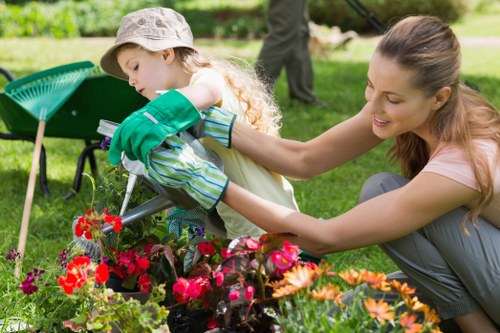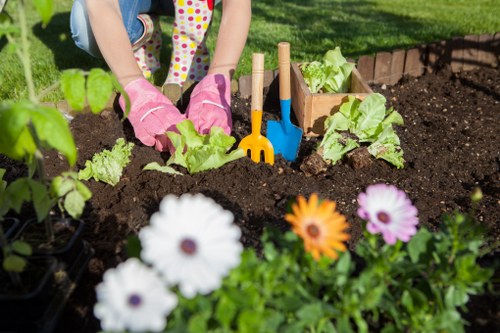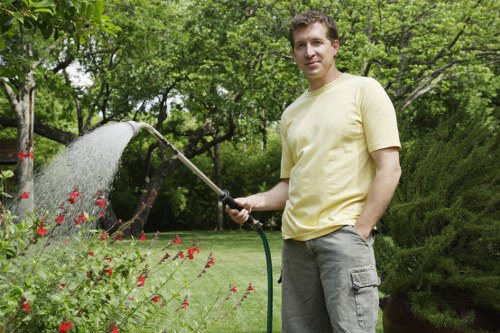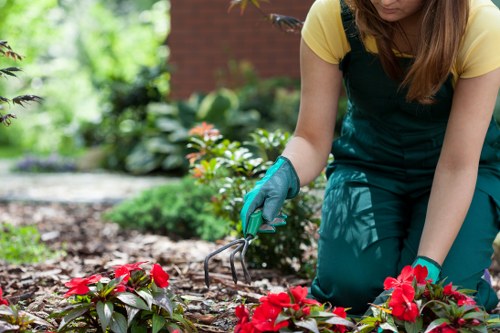Garden Fence Installation West Norwood

Installing a garden fence in West Norwood is a fantastic way to enhance the beauty, privacy, and security of your outdoor space. Whether you're looking to create a serene garden retreat or secure your property, a well-installed fence can make a significant difference. This guide will walk you through everything you need to know about garden fence installation in West Norwood, ensuring you make informed decisions for your home.
Choosing the right fence involves considering various factors such as the type of materials, design preferences, and the specific needs of your garden. With the right information, you can select a fence that not only complements your landscape but also stands the test of time.
In West Norwood, there are numerous options available for garden fence installation, catering to different styles and budgets. This article will explore the benefits, materials, installation process, and tips for maintaining your garden fence, helping you achieve the perfect outdoor space.
Importance of a Quality Garden Fence
A quality garden fence serves multiple purposes beyond mere decoration. It acts as a barrier, providing privacy and security for your property. Additionally, it can delineate boundaries, preventing pets and children from wandering into unwanted areas. A well-chosen fence also adds to the aesthetic appeal of your garden, enhancing the overall look of your home.
Privacy is a key factor for many homeowners when installing a garden fence. It allows you to enjoy your garden without the disturbance of passersby, creating a peaceful and secluded environment. Moreover, a sturdy fence can deter trespassers and potential intruders, adding an extra layer of security to your property.
Beyond privacy and security, a garden fence can also serve as a support structure for climbing plants and vines, adding greenery and life to your garden. This versatility makes garden fences an essential feature for any outdoor space.
Benefits of Installing a Garden Fence
There are numerous benefits to installing a garden fence in West Norwood, including:
- Enhanced Privacy: Create a secluded space where you can relax and unwind without external distractions.
- Increased Security: Protect your property from unwanted visitors and enhance safety for your family.
- Boundary Definition: Clearly mark the boundaries of your property, reducing disputes with neighbors.
- Aesthetic Appeal: Add a decorative element to your garden that complements your home's architecture.
- Support for Plants: Provide a structure for climbing plants, adding greenery and beauty to your outdoor space.
Choosing the Right Fence Material

Selecting the appropriate material for your garden fence is crucial for both functionality and appearance. The choice of material will affect the fence's durability, maintenance requirements, and overall look. Common materials include wood, metal, vinyl, and composite options, each with its own set of advantages.
Wooden fences offer a classic and natural appearance, making them a popular choice for many homeowners. They can be customized with various stains and paints, allowing for a high degree of personalization. However, wood requires regular maintenance to prevent rot, warping, and insect damage.
Metal fences, such as those made from wrought iron or aluminum, are known for their strength and longevity. They provide excellent security and can be designed with intricate patterns for added visual interest. Metal fences are generally low-maintenance, resisting rust and corrosion when properly treated.
Wood Fencing
Wood fencing is a versatile option that can be tailored to fit any garden style. It provides a warm and natural look that blends seamlessly with outdoor environments. Different types of wood, such as cedar, pine, and redwood, offer varying levels of durability and resistance to the elements.
Metal Fencing
Metal fencing, including iron and aluminum, is ideal for those seeking a durable and secure option. These fences can be crafted into elegant designs and are resistant to weathering, making them suitable for long-term use. They require minimal maintenance, typically needing only occasional cleaning to keep them looking their best.
Vinyl Fencing
Vinyl fencing is a low-maintenance alternative to wood and metal. It is resistant to rot, pests, and fading, ensuring that it remains attractive for many years with minimal upkeep. Vinyl fences come in a variety of styles and colors, providing flexibility in design choices.
The Installation Process

Proper installation is key to ensuring that your garden fence is secure, durable, and aesthetically pleasing. The installation process involves several steps, from planning and measurement to preparing the site and erecting the fence. Following these steps meticulously will help you achieve the best results.
Planning and Measurement: Begin by assessing your garden space and determining the exact location of the fence. Measure the area to calculate the amount of materials needed and to ensure that the fence aligns with property boundaries. It's also important to check local regulations and obtain any necessary permits before starting the installation.
Preparing the Site: Clear the installation area of any obstacles, such as rocks, weeds, or debris. Mark the fence line and ensure that it is straight and level. If you're replacing an old fence, remove it carefully to make way for the new installation.
Planning and Measurement
Accurate planning and measurement are foundational to a successful fence installation. Consider the purpose of the fence, whether it's for privacy, security, or decorative purposes, and choose a location that best suits these needs. Use stakes and string to outline the fence line, ensuring that it follows the desired path and adheres to property lines.
Preparing the Site
Preparing the site involves more than just clearing obstacles. Ensure that the ground is level and stable to support the fence. For wooden fences, this might mean treating the posts with preservatives to prevent rot. For metal and vinyl fences, ensure that the footing is deep enough to provide stability against wind and other forces.
Installation Steps
The actual installation steps will vary depending on the type of fence being installed. Generally, the process involves:
- Setting Fence Posts: Dig holes at regular intervals and set the fence posts securely, ensuring they are plumb and level.
- Attaching Panels or Rails: Once the posts are in place, attach the fence panels or rails according to the chosen design and material.
- Finishing Touches: Add any additional features such as gates, decorative elements, or protective coatings to complete the fence.
Hiring Professional Fence Installers in West Norwood

While DIY fence installation is possible, hiring professional installers in West Norwood can save you time and ensure a high-quality result. Professionals have the expertise, tools, and experience to handle various installation challenges, providing peace of mind and a flawless finish.
Why Professional Installation Matters: Professionals can ensure that your fence is installed correctly, adhering to local building codes and standards. They can also offer valuable advice on material selection, design, and maintenance, helping you make informed decisions that align with your needs and budget.
How to Choose the Right Installer: When selecting a fence installer, consider factors such as experience, reputation, and customer reviews. It's important to choose a contractor who is licensed, insured, and offers a warranty on their work. Requesting quotes and comparing services can also help you find the best fit for your project.
Why Professional Installation Matters
Professional fence installers bring a level of expertise that ensures your fence is not only aesthetically pleasing but also structurally sound. They can handle unexpected issues, such as uneven terrain or underground utilities, with ease, preventing potential problems down the line.
How to Choose the Right Installer
To choose the right installer in West Norwood, seek recommendations from neighbors or friends who have recently had fences installed. Review portfolios and ask for references to gauge the quality of their work. Additionally, ensure that the installer communicates clearly and is responsive to your questions and concerns.
Costs and Budgeting for Your Garden Fence

Understanding the costs associated with garden fence installation is essential for effective budgeting. Various factors influence the overall cost, including the type of material, fence height, length, and the complexity of the installation. By being aware of these factors, you can plan your budget accordingly and avoid unexpected expenses.
Factors Affecting Cost: The choice of material significantly impacts the cost, with wood typically being less expensive than metal or vinyl. Additionally, larger fences require more materials and labor, increasing the overall price. Installation complexity, such as uneven ground or intricate designs, can also affect costs.
Budgeting Tips: To manage your budget effectively, obtain multiple quotes from different installers and compare their offerings. Consider the long-term costs, such as maintenance and potential repairs, when choosing materials. Additionally, prioritize essential features and be willing to make compromises on non-essential aspects to stay within your budget.
Factors Affecting Cost
Several elements determine the overall cost of garden fence installation:
- Material: Different materials come with varying price points. For example, wood is generally more affordable than wrought iron.
- Length and Height: Larger and taller fences require more materials and labor, increasing the cost.
- Design Complexity: Intricate designs or custom features may require additional time and resources.
- Terrain: Uneven or rocky ground can make installation more challenging and costly.
- Permits and Regulations: Compliance with local building codes may involve additional expenses.
Budgeting Tips
To keep costs under control:
- Get Multiple Quotes: Compare prices from different installers to find the best deal.
- Choose Cost-Effective Materials: Opt for materials that offer a balance between cost and durability.
- Plan Ahead: Proper planning can prevent unexpected expenses during installation.
- Consider DIY Options: If feasible, handling parts of the installation yourself can reduce labor costs.
Maintenance Tips for Longevity
Maintaining your garden fence is crucial for ensuring its longevity and sustained appearance. Regular upkeep helps prevent damage from weather, pests, and general wear and tear, keeping your fence in excellent condition for years to come.
Regular Cleaning: Clean your fence periodically to remove dirt, debris, and any staining. For wooden fences, sanding and resealing may be necessary to protect against moisture and UV damage. Metal fences can be cleaned with mild soap and water, while vinyl fences require minimal maintenance.
Repairs and Upkeep: Inspect your fence regularly for signs of damage, such as broken boards, rust spots, or loose panels. Addressing these issues promptly can prevent further deterioration and extend the life of your fence.
Regular Cleaning
Keeping your fence clean not only maintains its appearance but also helps identify potential issues early on. Depending on the material, different cleaning methods may be required:
- Wood: Use a mild detergent and a soft brush to remove dirt and mildew. Repaint or stain as needed to protect the wood.
- Metal: Wipe down with a mixture of water and mild soap to prevent rust. Apply a protective coating if necessary.
- Vinyl: Wash with a garden hose and a mixture of water and mild soap. Avoid abrasive cleaners that can scratch the surface.
Repairs and Upkeep
Regular inspections are vital for catching and fixing minor issues before they escalate. Replace any damaged or rotten sections promptly, repaint or reseal surfaces as needed, and ensure that all fasteners and connectors are secure. Proper maintenance routines will keep your fence looking great and functioning effectively.
Nearby Areas to West Norwood for Garden Fence Installation
West Norwood is surrounded by several areas that also benefit from professional garden fence installation services. Here are some of the closest areas to consider:
- Crystal Palace: Known for its vibrant community and picturesque gardens, Crystal Palace residents often seek stylish and durable fence solutions.
- Dulwich With its historic homes and lush landscapes, Dulwich homeowners prefer elegant wooden and metal fences that complement their estates.
- Tulse Hill: Tulse Hill offers a mix of modern and traditional homes, requiring versatile fencing options to suit diverse architectural styles.
- Peckham A lively area with a growing number of gardens, Peckham residents look for affordable and functional fencing solutions.
- Gipsy Hill Surrounded by greenery, Gipsy Hill homeowners often choose fences that blend seamlessly with the natural environment.
- Penge With its suburban charm, Penge offers a range of fencing styles, from classic to contemporary, to suit different preferences.
- Honor Oak Honor Oak's blend of residential and commercial spaces means residents need sturdy and attractive fences for various applications.
- Sydenham: Known for its heritage buildings, Sydenham residents often opt for traditional fencing materials that preserve the area's character.
- Selhurst Selhurst offers a diverse community with varied fencing needs, from privacy barriers to decorative elements.
- Herne Hill With its affluent neighborhoods, Herne Hill homeowners typically invest in high-quality, custom fence installations.
- East Dulwich: East Dulwich's vibrant gardens and family-friendly atmosphere drive demand for safe and stylish fencing options.
- West Dulwich: Offering a peaceful setting, West Dulwich residents favor fences that enhance their tranquil gardens and outdoor spaces.
- West Dulwich: Offering a peaceful setting, West Dulwich residents favor fences that enhance their tranquil gardens and outdoor spaces.
- Queen's Grove: A mixed-use area, Queen's Grove requires fencing solutions that cater to both residential and commercial properties.
- Antony Grafton: Antony Grafton's close-knit community enjoys fences that provide security while maintaining aesthetic appeal.
Frequently Asked Questions
1. How long does it take to install a garden fence in West Norwood?
The installation time varies based on the size and complexity of the project. On average, a standard garden fence installation can take anywhere from a few days to a week. Factors such as weather conditions, material choice, and the installer’s schedule can also affect the timeline.
2. What maintenance is required for a wooden garden fence?
Wooden fences require regular maintenance to ensure longevity. This includes cleaning, staining or painting every few years, and inspecting for signs of rot or damage. Prompt repairs to any damaged sections are essential to prevent further deterioration.
3. Can I install a garden fence myself, or should I hire professionals?
While DIY installation is possible, hiring professional installers ensures that the fence is properly and securely installed. Professionals have the necessary tools and expertise to handle any challenges that may arise, providing peace of mind and a high-quality finish.
4. What materials are best for a low-maintenance garden fence?
Vinyl and metal fences are excellent choices for low-maintenance options. Vinyl fences are resistant to rot, pests, and fading, requiring minimal upkeep. Metal fences, such as aluminum or wrought iron, are durable and typically only need occasional cleaning to maintain their appearance.
5. Are there any local regulations I need to be aware of before installing a garden fence in West Norwood?
Yes, it’s important to check local building codes and regulations before installing a fence. Permits may be required, and there may be restrictions on fence height, materials, and placement. Consulting with local authorities or a professional installer can help ensure compliance with all relevant laws.
Frequently Asked Questions
Our West Norwood garden fence installers use eco-friendly weed control and precise hedge trimming to ensure a seamless fence installation. With advanced tools like ride-on mowers and high-quality materials, we deliver durable and aesthetically pleasing fences tailored to your garden's needs. Get in touch with our West Norwood gardeners for a tailored quote.
Yes, our West Norwood team is fully certified and carries comprehensive public liability insurance. We are licensed to handle all aspects of garden fence installation, ensuring peace of mind and professional service. Contact our trusted West Norwood gardeners to learn more about our qualifications and secure your garden project today.
With over 10 years of experience, our West Norwood garden fence installers have maintained local estates and private gardens with expertise and care. Our seasoned professionals ensure reliable and high-quality installations, tailored to your specific requirements. Choose our experienced team for your next garden fence project in West Norwood.
Our West Norwood garden fence installers utilize state-of-the-art equipment, including ride-on mowers, hedge trimmers, and eco-friendly weed control systems. These tools enable us to deliver precise and efficient fence installations, enhancing the beauty and functionality of your garden. Reach out to our West Norwood team for top-notch gardening services.
You can find licensed gardeners for fence installation in West Norwood by contacting our locally trusted gardening team. We are accredited with BALI and hold all necessary certifications to ensure professional and reliable service. Get in touch with our West Norwood gardeners to schedule your fence installation today.
Yes, garden fence installation in West Norwood is affordable with our competitive pricing and flexible packages. We offer high-quality materials and expert installation without breaking the bank. Contact our West Norwood team for a customized quote and discover how we can enhance your garden within your budget.
Our West Norwood gardeners are accredited with the Royal Horticultural Society (RHS) and BALI, demonstrating our commitment to high standards and professional excellence. These accreditations ensure that you receive top-quality garden fence installation and maintenance services. Choose our accredited team for reliable West Norwood garden solutions.
Safety is our top priority during fence installation in West Norwood. Our team follows strict safety protocols, uses protective equipment, and is fully trained in handling tools and materials safely. Additionally, we carry full insurance to protect your property and ensure a worry-free installation process. Trust our West Norwood gardeners for safe and secure fence installations.
We prioritize eco-friendly methods for garden fence installation near West Norwood by using sustainable materials and environmentally safe weed control techniques. Our approach minimizes environmental impact while delivering durable and beautiful fences. Contact our West Norwood team to learn more about our green garden fence solutions.
Absolutely! We offer comprehensive garden maintenance services in West Norwood, including hedge trimming, lawn care, and seasonal clean-ups to keep your garden and fence looking pristine. Our ongoing maintenance ensures the longevity and beauty of your garden fence. Get in touch with our West Norwood gardeners for continued garden care.
We provide seasonal services for garden fences in West Norwood, including spring lawn preparation, summer pruning, autumn leaf clearance, and winter protection measures. Our expert team ensures your garden fence remains in excellent condition year-round. Contact our West Norwood gardeners to schedule your seasonal maintenance.
Choose our trusted garden fence installation services in West Norwood for our combination of experience, certified professionals, and commitment to customer satisfaction. We use high-quality materials, eco-friendly methods, and offer comprehensive maintenance to ensure your garden fence stands the test of time. Reach out to our West Norwood team for reliable and exceptional garden solutions.




